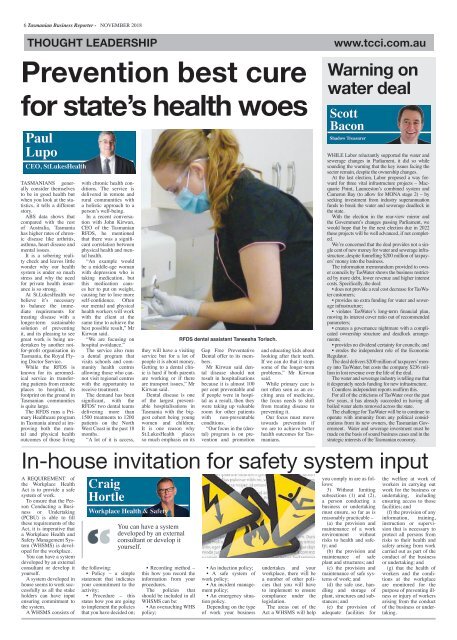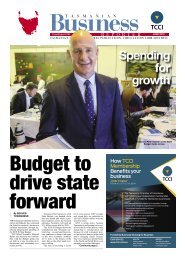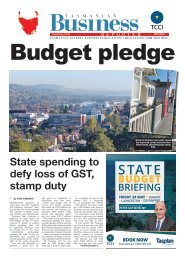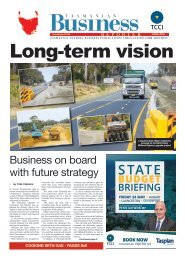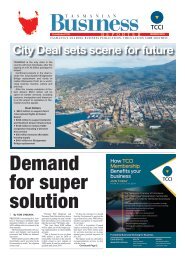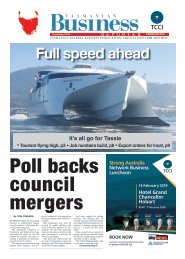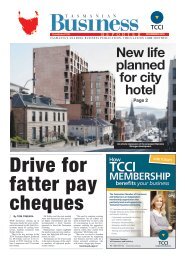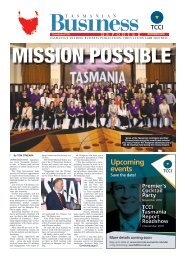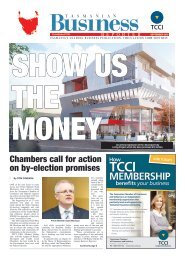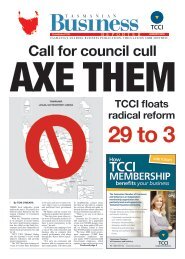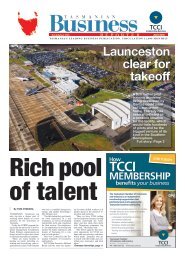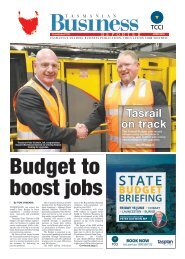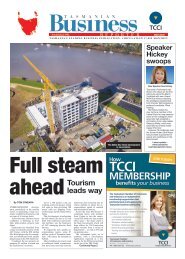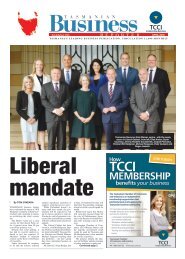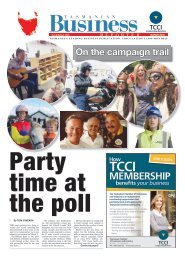Tasmanian Business Reporter November 2018
Welcome to the November edition of the Tasmanian Business Reporter. In this month's edition you'll read about the new vision for Macquarie Point, which TCCI CEO Michael Bailey believes is a once-in-a-generation opportunity for Tasmania if planned correctly and underpinned by residential development. You will also find details about a new Hobart fashion festival and strong profits from Tasmania’s two financial institutions, as well as some poignant HR tips for employers about how to handle the upcoming 'silly season' from TCCI Workplace Relations Consultant Abbey George.
Welcome to the November edition of the Tasmanian Business Reporter.
In this month's edition you'll read about the new vision for Macquarie Point, which TCCI CEO Michael Bailey believes is a once-in-a-generation opportunity for Tasmania if planned correctly and underpinned by residential development.
You will also find details about a new Hobart fashion festival and strong profits from Tasmania’s two financial institutions, as well as some poignant HR tips for employers about how to handle the upcoming 'silly season' from TCCI Workplace Relations Consultant Abbey George.
Create successful ePaper yourself
Turn your PDF publications into a flip-book with our unique Google optimized e-Paper software.
6 <strong>Tasmanian</strong> <strong>Business</strong> <strong>Reporter</strong> - NOVEMBER <strong>2018</strong><br />
THOUGHT LEADERSHIP<br />
Prevention best cure<br />
for state’s health woes<br />
Paul<br />
Lupo<br />
CEO, StLukesHealth<br />
TASMANIANS generally<br />
consider themselves<br />
to be in good health but<br />
when you look at the statistics,<br />
it tells a different<br />
story.<br />
ABS data shows that<br />
compared with the rest<br />
of Australia, Tasmania<br />
has higher rates of chronic<br />
disease like arthritis,<br />
asthma, heart disease and<br />
mental issues.<br />
It is a sobering reality<br />
check and leaves little<br />
wonder why our health<br />
system is under so much<br />
stress and why the need<br />
for private health insurance<br />
is so strong.<br />
At St.LukesHealth we<br />
believe it’s necessary<br />
to balance the immediate<br />
requirements for<br />
treating disease with a<br />
longer-term sustainable<br />
solution of preventing<br />
it, and its pleasing to see<br />
great work is being undertaken<br />
by another notfor-profit<br />
organisation in<br />
Tasmania, the Royal Flying<br />
Doctor Service.<br />
While the RFDS is<br />
known for its aeromedical<br />
service in transferring<br />
patients from remote<br />
places to hospital, its<br />
footprint on the ground in<br />
<strong>Tasmanian</strong> communities<br />
is quite large.<br />
The RFDS runs a Primary<br />
Healthcare program<br />
in Tasmania aimed at improving<br />
both the mental<br />
and physical health<br />
outcomes of those living<br />
with chronic health conditions.<br />
The service is<br />
delivered in remote and<br />
rural communities with<br />
a holistic approach to a<br />
person’s well-being.<br />
In a recent conversation<br />
with John Kirwan,<br />
CEO of the <strong>Tasmanian</strong><br />
RFDS, he mentioned<br />
that there was a significant<br />
correlation between<br />
physical health and mental<br />
health.<br />
“An example would<br />
be a middle-age woman<br />
with depression who is<br />
taking medication, but<br />
this medication causes<br />
her to put on weight,<br />
causing her to lose more<br />
self-confidence. Often<br />
our mental and physical<br />
health workers will work<br />
with the client at the<br />
same time to achieve the<br />
best possible result,” Mr<br />
Kirwan said.<br />
“We are focusing on<br />
hospital avoidance.”<br />
The service also runs<br />
a dental program that<br />
visits schools and community<br />
health centres<br />
allowing those who cannot<br />
visit regional centres<br />
with the opportunity to<br />
receive treatment.<br />
The demand has been<br />
significant, with the<br />
RFDS’ two dental teams<br />
delivering more than<br />
1500 treatments to 1200<br />
patients on the North<br />
West Coast in the past 18<br />
months.<br />
“A lot of it is access,<br />
they will have a visiting<br />
service but for a lot of<br />
people it is about money.<br />
Getting to a dental clinic<br />
is hard if both parents<br />
are working or if there<br />
are transport issues,” Mr<br />
Kirwan said.<br />
Dental disease is one<br />
of the largest preventable<br />
hospitalisations in<br />
Tasmania with the biggest<br />
cohort being young<br />
women and children.<br />
It is one reason why<br />
St.LukesHealth places<br />
so much emphasis on its<br />
RFDS dental assistant Taneesha Torlach.<br />
Gap Free Preventative<br />
Dental offer to its members.<br />
Mr Kirwan said dental<br />
disease should not<br />
result in hospitalisations<br />
because it is almost 100<br />
per cent preventable and<br />
if people were in hospital<br />
as a result, then they<br />
were taking up valuable<br />
room for other patients<br />
with non-preventable<br />
conditions.<br />
“Our focus in the (dental)<br />
program is on prevention<br />
and promotion<br />
and educating kids about<br />
looking after their teeth.<br />
If we can do that it stops<br />
some of the longer-term<br />
problems,” Mr Kirwan<br />
said.<br />
While primary care is<br />
not often seen as an exciting<br />
area of medicine,<br />
the focus needs to shift<br />
from treating disease to<br />
preventing it.<br />
Our focus must move<br />
towards prevention if<br />
we are to achieve better<br />
health outcomes for <strong>Tasmanian</strong>s.<br />
www.tcci.com.au<br />
Warning on<br />
water deal<br />
Scott<br />
Bacon<br />
Shadow Treasurer<br />
WHILE Labor reluctantly supported the water and<br />
sewerage changes in Parliament, it did so while<br />
sounding the warning that the key issues facing the<br />
sector remain, despite the ownership changes.<br />
At the last election, Labor proposed a way forward<br />
for three vital infrastructure projects – Macquarie<br />
Point, Launceston’s combined system and<br />
Cameron Bay (to allow for MONA stage 2) – by<br />
seeking investment from industry superannuation<br />
funds to break the water and sewerage deadlock in<br />
the state.<br />
With the election in the rear-view mirror and<br />
the Government’s changes passing Parliament, we<br />
would hope that by the next election due in 2022<br />
these projects will be well advanced, if not completed.<br />
We’re concerned that the deal provides not a single<br />
cent of new money for water and sewerage infrastructure,<br />
despite funnelling $200 million of taxpayers’<br />
money into the business.<br />
The information memorandum provided to owner<br />
councils by TasWater shows the business restricted<br />
by more debt, lower revenue and higher interest<br />
costs. Specifically, the deal:<br />
• does not provide a real cost decrease for TasWater<br />
customers;<br />
• provides no extra funding for water and sewerage<br />
infrastructure;<br />
• violates TasWater’s long-term financial plan,<br />
moving its interest cover ratio out of recommended<br />
parameters;<br />
• creates a governance nightmare with a complicated<br />
ownership structure and deadlock arrangements;<br />
• provides no dividend certainty for councils; and<br />
• erodes the independent role of the Economic<br />
Regulator.<br />
The deal delivers $200 million of taxpayers’ money<br />
into TasWater, but costs the company $236 million<br />
in lost revenue over the life of the deal.<br />
The water and sewerage industry is telling me that<br />
it desperately needs funding for new infrastructure.<br />
Countless independent reports reaffirm this.<br />
For all of the criticisms of TasWater over the past<br />
few years, it has already succeeded in having all<br />
boiled water alerts removed across the state.<br />
The challenge for TasWater will be to continue to<br />
operate with immunity from any political considerations<br />
from its new owners, the <strong>Tasmanian</strong> Government.<br />
Water and sewerage investment must be<br />
made on the basis of sound business cases and in the<br />
strategic interests of the <strong>Tasmanian</strong> economy.<br />
In-house invitation for safety system input<br />
A REQUIREMENT of<br />
the Workplace Health<br />
Act is to provide a safe<br />
system of work.<br />
To ensure that the Person<br />
Conducting a <strong>Business</strong><br />
or Undertaking<br />
(PCBU) is able to fill<br />
these requirements of the<br />
Act, it is imperative that<br />
a Workplace Health and<br />
Safety Management System<br />
(WHSMS) is developed<br />
for the workplace.<br />
You can have a system<br />
developed by an external<br />
consultant or develop it<br />
yourself.<br />
A system developed in<br />
house seems to work successfully<br />
as all the stake<br />
holders can have input<br />
ensuring commitment to<br />
the system.<br />
A WHSMS consists of<br />
Craig<br />
Hortle<br />
Workplace Health & Safety<br />
the following:<br />
• Policy – a simple<br />
statement that indicates<br />
your commitment to the<br />
activity;<br />
• Procedure – this<br />
states how you are going<br />
to implement the policies<br />
that you have decided on;<br />
You can have a system<br />
developed by an external<br />
consultant or develop it<br />
yourself.<br />
• Recording method –<br />
this how you record the<br />
information from your<br />
procedures.<br />
The policies that<br />
should be included in all<br />
WHSMS can be:<br />
• An overarching WHS<br />
policy;<br />
• An induction policy;<br />
• A safe system of<br />
work policy;<br />
• An incident management<br />
policy;<br />
• An emergency situation<br />
policy.<br />
Depending on the type<br />
of work your business<br />
undertakes and your<br />
workplace, there will be<br />
a number of other policies<br />
that you will have<br />
to implement to ensure<br />
compliance under the<br />
legislation.<br />
The areas out of the<br />
Act a WHSMS will help<br />
you comply in are as follows:<br />
3) Without limiting<br />
subsections (1) and (2),<br />
a person conducting a<br />
business or undertaking<br />
must ensure, so far as is<br />
reasonably practicable –<br />
(a) the provision and<br />
maintenance of a work<br />
environment without<br />
risks to health and safety;<br />
and<br />
(b) the provision and<br />
maintenance of safe<br />
plant and structures; and<br />
(c) the provision and<br />
maintenance of safe systems<br />
of work; and<br />
(d) the safe use, handling<br />
and storage of<br />
plant, structures and substances;<br />
and<br />
(e) the provision of<br />
adequate facilities for<br />
the welfare at work of<br />
workers in carrying out<br />
work for the business or<br />
undertaking, including<br />
ensuring access to those<br />
facilities; and<br />
(f) the provision of any<br />
information, training,<br />
instruction or supervision<br />
that is necessary to<br />
protect all persons from<br />
risks to their health and<br />
safety arising from work<br />
carried out as part of the<br />
conduct of the business<br />
or undertaking; and<br />
(g) that the health of<br />
workers and the conditions<br />
at the workplace<br />
are monitored for the<br />
purpose of preventing illness<br />
or injury of workers<br />
arising from the conduct<br />
of the business or undertaking.


